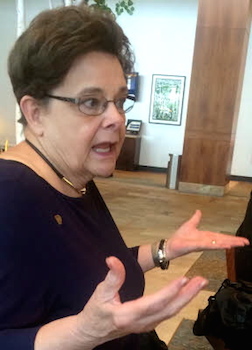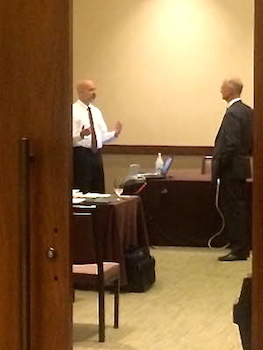
VIN News Service photo
Dr. Mary Beth Leininger's yearlong battle to regain her seat on the Council on Education climaxed Tuesday in Boston when her case was appealed before the American Veterinary Medical Association Board of Governors.
"I’m still standing."
That’s all Dr. Mary Beth Leininger could publicly say following a four-hour hearing before the American Veterinary Medical Association Board of Governors, which met Tuesday in Boston.
What happened behind closed doors is confidential. So far, the board has not made a final decision.
The matter in question is Leininger’s status on the Council on Education, the AVMA’s 20-member volunteer-based accrediting body that for years has been the subject of mounting pressure to get out from under the association’s control. Leininger, a former AVMA president, was kicked off the COE in March 2014 after publicly suggesting that the body might be stretched thin between its responsibility to evaluate a growing number of domestic programs and mounting requests to assess schools overseas.
Her views were considered by some to conflict with her role on the COE.
The COE has operated under the AVMA’s umbrella since the 1950s, when the United States Department of Education (USDE) named it the nation’s sole programmatic accreditor of domestic veterinary education. Programmatic accreditors provide schools, including foreign programs that accept U.S. citizens, the ability to offer students access to professional loans under Title VII of the U.S. Public Health Act.
In a recent twist, USDE tapped the COE for an even larger responsibility — ensuring that foreign veterinary schools are qualified to participate in Title IV federal student aid, which includes programs such as Pell Grants, Direct Loans and Perkins Loans. The COE's new role began July 1, per federal regulations that ordered USDE to find an accrediting body to do the job for veterinary education.
How the COE’s new status as a Title IV gatekeeper will play out this week is an unknown considering the evaluating system is facing attempts by AVMA policymakers to upend how it operates. The AVMA House of Delegates convenes Thursday in Boston to consider resolutions that put a temporary moratorium on accreditation and sever ties between the AVMA and its evaluating agency.
Advocates for change want the COE to operate with greater autonomy to shield accrediting decisions from the potential influence of some AVMA leaders. The call stems from concerns that the evaluating body bows to the AVMA’s self-imposed mission to accredit foreign schools and non-traditional domestic programs, diverting attention from traditional U.S. veterinary programs.

VIN News Service photo
Newly hired COE attorney Doug Carlson advised COE chair Dr. Fred Derksen (left) ahead of the four-hour private hearing.
Whether that's true is up for debate. Those who support the current system believe the COE best serves the profession with the nation’s largest veterinary association at the helm. What’s more, they say, spreading U.S. accreditation overseas helps elevate veterinary medicine internationally.
The AVMA Board of Governors, with authority to perform business in between meetings of the AVMA Board of Directors, is not involved in that argument. Each of its three members — Drs. Ted Cohn, AVMA president; Joe Kinnarney, AVMA president-elect; and Chip Price, chair of the Board of Directors — will vote simply on whether Leininger should regain her COE seat.
Her appeal is being eyed by a USDE oversight panel that chastised AVMA and COE officials in December 2014 for doing a poor job of reaching out to critics after the government received more than 800 letters from veterinarians calling for federal officials to suspend recognition of the COE in an effort to force change.
Right now, the COE is operating on a temporary extension of its status as a programmatic accreditor until it meets USDE-ordered fixes that include reaching out to critics.
As far as Leininger's case is concerned, it’s unclear when the Board of Governors will make a decision or if there’s an avenue to appeal it. The uncertainties speak to the fact that her case is unprecedented.
Cohn noted the ambiguity in response to a VIN News Service query. "Sorry, I’m not sure on either of your questions," he said.